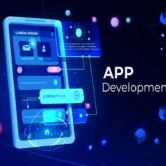
Briefly present the future of app lifecycle management in the Indian IT domain.
Introduction
India’s IT domain has evolved from a service-oriented industry into a dynamic digital transformation powerhouse. As enterprises, startups, and government bodies rely increasingly on mobile and web applications to serve millions, the need for efficient app lifecycle management is more critical than ever. From planning and development to deployment, monitoring, scaling, and retirement, managing an application’s lifecycle is no longer a linear task—it’s an adaptive, real-time process that continues to evolve with technology and user expectations. The future of app lifecycle management in the Indian IT sector will be shaped by intelligent automation, user personalization, cross-platform integration, and compliance readiness. As demand for faster releases, better performance, and secure operations intensifies, the Indian IT ecosystem is poised to redefine how apps are managed from inception to obsolescence.
Shift toward AI-driven lifecycle automation
One of the most significant changes in the future of app lifecycle management is the integration of artificial intelligence. Indian IT firms are already adopting AI to predict system failures, identify user behavior patterns, and automate testing workflows. In the coming years, AI will further enhance lifecycle automation by enabling smart monitoring, predictive updates, and autonomous scaling decisions. App managers will rely on machine learning algorithms to adjust application configurations dynamically and reduce human intervention in maintenance.
Rise of low-code and no-code development models
With the increasing need for rapid development and innovation, India’s IT space is witnessing the emergence of low-code and no-code platforms. These tools simplify the development phase of the app lifecycle by allowing users with minimal technical knowledge to build and modify applications. As these platforms become more robust and scalable, app management will evolve to support faster prototyping, frequent iterations, and easier updates—especially in the SME and startup ecosystems across India.
Integration with DevOps and continuous delivery pipelines
The DevOps culture, already prevalent in India’s IT companies, will further strengthen the lifecycle management process. App lifecycle will be tightly integrated with CI/CD pipelines, allowing for real-time deployment, rollback, and update strategies. App managers will become an active part of the DevOps loop, participating in automated testing, security validation, and release coordination. Continuous delivery will ensure that applications are always production-ready, meeting evolving user needs with agility.
Expansion of cloud-native and microservices architectures
As Indian enterprises migrate to the cloud, app lifecycle management will align more with microservices and containerized deployment strategies. Kubernetes, Docker, and serverless technologies will become core components of the management lifecycle. These cloud-native tools enable modular lifecycle processes where individual app components can be developed, tested, scaled, and retired independently. This shift improves performance, simplifies updates, and enhances app resilience across diverse workloads.
Increased focus on user analytics and behavior modeling
The future of app management in India will place a strong emphasis on user-centric metrics. App managers will use advanced analytics platforms to monitor engagement, retention, feature adoption, and satisfaction levels. These insights will influence decision-making at every lifecycle stage—driving feature planning, user interface redesigns, and content customization. Personalized lifecycle flows, informed by real-time analytics, will ensure that applications evolve in sync with user expectations.
Enhanced security and compliance embedding
Security and compliance will no longer be post-deployment concerns but integral to the entire app lifecycle. With laws like the Digital Personal Data Protection Act and growing focus on data localization in India, lifecycle management strategies will embed compliance checkpoints at every stage. This includes privacy-by-design architecture, consent management, encryption protocols, and secure user authentication. Regular compliance audits and automated legal validations will become standard practice for public and enterprise-facing apps.
Adoption of multilingual and inclusive design practices
As India’s digital reach expands into tier-2 and tier-3 cities, app lifecycle management will have to accommodate linguistic and cultural diversity. Multi-language support, voice interfaces, and accessible design will be built into the earliest stages of app planning and carried throughout the lifecycle. Inclusive app management will not only increase market reach but also align with Digital India’s goals of universal access. Tamil, Hindi, Bengali, and other regional languages will be native elements of app workflows.
Lifecycle visibility through centralized dashboards
Future app managers will have complete visibility into their app lifecycle via centralized dashboards powered by real-time data. These platforms will integrate project timelines, testing status, performance metrics, user feedback, and security alerts into one interface. Indian IT firms will use these dashboards to make informed decisions, reduce redundancies, and optimize resource allocation. Enhanced lifecycle visibility improves coordination across teams and speeds up the time to resolution.
Data-driven scalability and infrastructure planning
As India becomes a global hub for app-driven services, lifecycle strategies will increasingly rely on intelligent data to plan infrastructure growth. Demand forecasting, bandwidth analysis, and usage heatmaps will guide capacity planning decisions. App management will move from reactive scaling to proactive resource optimization. Indian firms operating in fintech, retail, logistics, and edtech will use data to minimize downtime and reduce cloud spending while maintaining service continuity.
Greater collaboration between product and operations teams
The future will see tighter collaboration between product managers, developers, testers, and operations teams throughout the app lifecycle. In India’s IT companies, this will foster a shift from siloed responsibilities to shared ownership of application performance and user experience. Lifecycle management will become a cross-functional discipline where strategy, execution, and optimization occur in unified cycles—boosting innovation, reducing errors, and improving delivery speed.
Conclusion
The future of app lifecycle management in the Indian IT domain is intelligent, collaborative, agile, and user-focused. As emerging technologies like AI, cloud computing, and automation reshape the way apps are built and maintained, Indian IT firms must adapt by embedding these capabilities into every stage of the lifecycle. Compliance, personalization, scalability, and accessibility will no longer be optional features—they will be integral to successful app strategy. With India at the forefront of global digital transformation, the evolution of app lifecycle management will serve as both a benchmark and a blueprint for delivering resilient, innovative, and inclusive digital solutions.
Hashtags
#AppLifecycleIndia #DigitalIndia #FutureOfApps #AppManagement #AITechIndia #CI_CDIntegration #DevOpsCulture #CloudNativeApps #MicroservicesIndia #ComplianceInTech #DataDrivenDecisions #UXAnalytics #InclusiveDesign #MultiLanguageSupport #SmartAppDevelopment #AgileTechIndia #AppMonitoring #UserCentricApps #SecureApps #ITInnovationIndia #LowCodeNoCode #AutomationInIT #DigitalTransformation #ITStrategyIndia #NextGenAppLifecycle





